- Home
- Elif Shafak
The Architect's Apprentice Page 23
The Architect's Apprentice Read online
Page 23
‘Will somebody tell me what’s going on?’ inquired Jahan nervously.
‘You always wanted to ride this horse, didn’t you? This is our gift to you.’
‘But Kamil Agha –’
Olev cut short his words with a raise of his hand. ‘Don’t worry, it’s all arranged. He’s not in the palace tonight. He’s out visiting the hamam of sorrows. Don’t ask me where that place may be, I cannot tell.’
‘But what do you expect me to do with the horse?’
‘Nothing,’ Olev responded, giving a wink. ‘Just go and ride down the hill.’
A little while later, a shadow shot out of the stable gates: Jahan, lying so low his body was level with the horse’s back, riding Tempest into the dark. The two guards by the gates, having been bribed beforehand, couldn’t care less. He galloped in the direction Olev had mentioned, enjoying the wind on his face, feeling free and reckless for once. After a bit he slowed down. There, in the near-distance, was a cart and huddled together on it were the Gypsies!
‘What on earth?’ Jahan exclaimed. ‘When did you get out of prison?’
‘Oh, we’d all been released about a month before you. We just waited with you until you were pardoned,’ said Balaban.
‘What? Why didn’t you tell me?’ stammered Jahan. ‘What are you doing here at this hour?’
‘The lion-man sent us word,’ Balaban said, as he tethered Tempest’s reins to the back of the cart. ‘Your friends had a chat about you, it seems. They think it’s time for you to have a bit of pleasure. You deserve it.’
‘What does that mean?’ Jahan said suspiciously.
The glance that the Gypsies exchanged was one of amusement.
‘You’ll see,’ said Balaban, and before Jahan could object he whipped the donkey. The cart set off, followed by Tempest.
The cart rattled along, passing through the country lanes and the field tracks. Though it was a crisp autumn evening, with the sky a velvety black, patches of mist were rolling up northwards, edging towards the outer ends of the city. A blanket of fog swallowed the winding streets and arching bridges, and Istanbul swallowed them. They passed through alleyways, many of which were so narrow – with wooden houses on both sides buckled like saplings bent in a gale – that their axles scraped the walls as they rode by. Each neighbourhood they left behind seemed quieter, mustier and more doleful than the last. Balaban fell silent. All they heard for a long time, other than the occasional squawk from a seagull, was the clatter of hooves and wheels on the cobblestones.
The wagon came to a halt and they climbed off. Taking a breath to steady himself, Jahan jumped down from the horse, looked around for a familiar sight and found none.
‘Come on,’ Balaban said, nudging him. ‘Movement is a blessing.’ Putting his right hand on his heart, the chieftain turned to his men. ‘You go, God go with you.’
Jahan trod behind Balaban. At each step the street smells intensified – traces of jasmine mingling with the tang of the sea and the whiffs of food, briny and garlicky. Tamers learned a lot from their animals and there was one thing Chota had hammered into him: how to sniff better. So he paid more attention to these scents in the breeze, and after a while he caught a hint of perfumed oils from a house nearby.
‘What is this place?’ whispered Jahan.
Balaban chuckled. ‘Don’t you get it? We’ve brought you to the bawdy house!’
Jahan paled. ‘I refuse to go.’
‘What? You afraid of the wenches? We’ll just go in and take a look. If you don’t like what you see, we’ll leave. May my blood redden the soil under your feet if I lie. Come on, Indian. After all we’ve gone through in the gaol, listen to me.’
Jahan dithered. He could neither accept nor refuse. Balaban pushed him, ceaselessly talking to assuage his fear. He explained that a brothel in Istanbul was a bit like the beginning of a Turkish tale – Once there was, once there wasn’t. Several harlots could dwell under the same roof for months, and, just when you thought they would be there forever, they’d vanish into thin air, the house an empty shell. Then there were the wives, as poor as a mouse in a looted larder, their husbands gone to war or good for nothing, who would become strumpets – though only on certain occasions, few and far between.
In most neighbourhoods the women who were thought to be of easy virtue were pelted with curses and stones. Often they woke up with tar rubbed on the thresholds of their homes, slanders scrawled on their walls. At times these women could be arrested, even imprisoned. Strumpets were made to sit backwards on mules and to ride through the streets so that everybody could see what was due to the likes of them.
But the kadis were a varied bunch and just as confused as everyone else, Balaban said. As much as they loathed the harlots, they saw the trade as an evil bound to happen and a boon for the treasury, since it was taxed. The only time it was strictly forbidden was in the month of Ramadan. During the rest of the year, whoredom was the only transgression that both was and wasn’t a crime.
The district of Eyup had, a little while back, become strict and issued a number of decrees. Taverns were closed, as were whorehouses and coffee-houses that allowed gambling. All ladies of ill-repute were banished, even those who had given up the life and married. To avoid the same fate, the painted women moved from one place to another, depending on the weather.
‘Harlotry is like the wind,’ said Balaban; ‘if you try to clap it in irons, it will slip away through the holes.’
With that they reached the door. It was opened by a black man. Upon seeing Balaban, he bowed and said, ‘Master, welcome.’
‘You own this place?’ Jahan muttered in surprise.
Balaban gave the servant a frosty glance. He turned to Jahan and, raising both hands, he said, ‘I’m a poor Romany. D’you think this a house on wheels? How can I own it? Come, let’s not waste time.’
They were ushered upstairs, where an elderly woman, her face as wrinkled as a walnut, greeted Balaban with much esteem. Next to her was a basket, inside of which was a mother cat with six kittens, curled in balls, all with the same thick, smoke-grey coat. ‘They were born here,’ she said. ‘Each named after one of my girls.’
Those girls, Jahan learned, were: Arab Fatima; Nefise the Venetian; Kurd Kamer; Narin the Circassian; Zarife the Turk; Leah the Jewess; and Ani the Armenian.
To their left and right, there were closed doors, from behind which Jahan could hear an occasional murmur. Balaban pushed Jahan into one of the rooms, made him sit on cushions, said he’d better go to check on the musicians and disappeared.
A maid appeared carrying a tray. She had flaming hair and sad scars on both sides of her face. Her eyes had a distant look, as if in search of other, long-ago evenings. She brought him water, wine and plates piled with goat’s cheese, sweetened figs, roasted almonds, pickles. Placing them on a low table, she asked if there was anything else he would like. Jahan shook his head, fixing his stare on the patterns of the carpet. As soon as the maid left, two women walked into the room on each other’s heels. One was so fat she had three chins. Her cheeks were round and bright red. It occurred to Jahan that if Chota had been there he would have gulped them down for apples. The thought made him smile.
She beamed. ‘You like me?’
‘No,’ Jahan exclaimed. Not wanting to appear rude, he added hastily, ‘Well, yes, but not like that.’
They giggled – she more than the other. The flesh on her belly bounced up and down. Smacking her lips, she leaned forward. ‘I’ve three breasts and there’s a monster in my belly that comes out when I’m hungry. I eat men!’
Jahan looked at her in horror. They broke into another peal of laughter.
‘Could one of you call Balaban?’ Jahan said. ‘I need to see him.’
They exchanged glances, fearing their teasing might have gone too far. The room felt hot, fusty. Rising to his feet, Jahan mumbled an apology and, like an arrow, shot out of the room. At the last moment he noticed that the women, too, had stood up and were following him. S
wiftly, he closed the door and slipped the bolt on it. Outside, by the stairs, he careened into the maid, who had been carrying the tray.
‘Are you all right?’ she said. ‘You going?’
‘Yes, Chota’s waiting.’
‘Is that your wife?’
Despite himself Jahan smiled. ‘Nay, he’s my elephant. Huge animal.’
Her dark eyes brightened. ‘I know what an elephant is.’
All at once the women locked in the room began to pound on the door. Jahan paled. The last thing he wanted was to be caught. He looked around in panic.
‘Come with me,’ the maid said, taking him by the hand.
Through a hatch at the back they reached a flight of creaky stairs. She led him to her room in the attic, where the ceiling was so low they had to stoop. Yet, under the half-moon, the view out of the window was charming – a forest of tall pine trees and, beyond that, the sea in stripes of black. From up here the water seemed like something else, soft and solid, a massive silk shawl spread round the shoulders of the city.
Jahan told her what had happened downstairs, which amused her greatly. She said her name was Peri. She’d been a camp-follower in times past, but not any more. After her face had been marred – by a soldier who had seen such things on the battlefield that he had become sick in the head and took out his anger on harlots – no one desired her.
‘It’s not true no man will want you,’ said Jahan. ‘You’re prettier than those women downstairs.’
She kissed him and he kissed her back, the taste of her tongue lingering in his mouth. She caressed his hair, her fingertips soft and warm against his forehead, which was creased with worry. ‘You have never done it, have you?’ she asked.
The deep blush on his face was enough of an answer for her. She made him lie down and slowly took off his clothes. At the touch of her lips on his skin, desire surged through him. Jahan had never known that such a kingdom of pleasure existed. Only years later would he understand how lucky he had been for having someone like her to show him the way.
In the dark, while he slept next to Peri, he saw himself in an unknown land riding Chota. They pranced on top of mansions, hopping from one roof to another. Then he saw Mihrimah in the distance, wearing a dress of white linen, her hair fluttering in the wind. ‘Wait!’ he yelled. She did not hear. He shouted again. Every time he opened his mouth it was yet another lost scream.
‘Shh, wake up.’
It took Jahan a moment to remember where he was, and when he did he was drenched in cold sweat. Dressing fast, he mumbled, ‘I ought to go.’ He stopped, noticing that her face was clouding over. ‘I’m sorry. I don’t know … this, I … pay you?’
Peri turned her head. ‘You don’t owe me anything.’
Jahan went close, caressed her hair. Inside him confusion was fermenting, soon to turn into the sharpest guilt. He knew he had to leave before that occurred. He didn’t want Peri to witness what had happened between them changing into regret.
‘You’ve been talking in your sleep,’ Peri said as she opened the door.
‘Did I disturb you?’
Peri ignored the question. ‘She dwells in your heart, clearly. Whoever she is. Does she know you love her?’
Dazed, discomfited, Jahan left the house. He would never have dared to call this thing he felt for Mihrimah love, and yet when it was uttered, unveiled, by someone else, he carefully picked up the word and hugged it to his chest, not willing to let go.
A hundred and thirty hands were hired for the repair of the aqueducts. They worked in two teams – the first on the west wing, the second on the middle part, where the decay had been most severe. In the meantime the four apprentices, with the help of an astrolabe, measured the depths of valleys and the heights of peaks. As was his wont, Sinan ordered them to research the methods undertaken by the craftsmen of the past. They needed to understand how the Byzantines had succeeded and how they had failed if they wished to do better themselves.
Davud and Yusuf, adept at the science of geometry, took the measurements of the waterways. Nikola and Jahan, trudging up and down the hills, logged all the broken canals and the clogged runnels. In some places the water rushed through a gorge because the conduits had fallen into disrepair. Water was dispersed amid green meadows, returned to the earth without having been of use to human beings. In other parts they had to find the source of the stream and excavate the conduits. They dammed the water to make it flow in a single direction, towards the city. Then, with the aid of a new ditch, they made it run the length of the dale. At every stage they measured the quantity – using brass spouts attached to tanks with sluices – calculating how much water had accumulated along the way.
A week later Jahan began to notice something strange. The labourers were giving them a wide berth, reluctant to carry out the orders. The more he observed them, the more he was convinced that they were looking for excuses not to hammer a nail, carry a plank, or do the slightest thing, which, when added together, was enough to hold everything back.
He pulled aside one of the draughtsmen – a Kurd named Salahaddin. His wife had recently given birth to twin boys. Knowing him to be an honest man, Jahan expected him to tell the truth.
‘What’s going on? Why’s everyone slow?’
Salahaddin averted his gaze. ‘We’re workin’, effendi.’
‘You are falling behind – why?’
A little blush crept into his cheeks. ‘You didn’t tell us there was a saint here.’
‘Who says that?’
The man shrugged, refusing to give names.
Jahan tried another question. ‘How do they know there’s a saint?’
‘They have seen … an apparition,’ Salahaddin replied, glancing at Jahan, as if for confirmation.
It was the ghost of a martyr – a mettlesome Muslim soldier who had met his end while fighting the infidels. An arrow had pierced his chest and entered his heart, yet he had kept on fighting relentlessly for two more days. On the third morning he had fallen and was buried in this area. Now his soul, disturbed by the hustle and bustle of the construction, was appearing to the labourers, who fretted that the ghost would put a curse on them.
‘Nonsense. Whoever is spreading this story wants to harm Master Sinan.’
‘It’s true, effendi,’ said Salahaddin. ‘People have seen it.’
‘Where?’ Jahan said, throwing up his hands in exasperation. ‘Show me!’
To his surprise, the man pointed with his chin at the scaffolding.
‘Has the ghost set up home there?’ Jahan asked teasingly.
But Salahaddin was solemn. ‘That’s where he was seen.’
During the rest of the afternoon Jahan prowled around the scaffolding, checking the planks, tightening the ropes, making sure it was safe, scowling at every man who so much as threw a glance at him.
‘You are not paying attention,’ said Davud, when they were studying the measurements the next day.
‘I’m sorry. My mind –’ said Jahan and gasped. In that moment something had caught his eye – on the raised wooden platform, down along the third tier. A few labourers were working there, one of them carrying a bucket. He watched the man sway on his feet, as if pushed by an invisible hand, then regain his balance. The hairs on the back of Jahan’s neck stiffened. In the past, whenever timber was scarce, they had used platforms dangling from abutments above to save wood. But this one rose from the ground and was attached to the walls, supported by struts and trusses. For it to move to and fro, the ropes must have come loose and a part of the edifice must have been hanging free – a part or all.
‘Are you all right?’ asked Davud, following his gaze.
A scream of panic shattered the hum of work. They watched a board flip in the air, whirling as though it were a leaf in the wind, and plummet to the ground. Another board hit a mason, landing on his head with a sickening thud. People ran left and right as timber and metal rained from above.
‘Kiyamet, kiyamet,’* someone wailed.
Oxen bellowed in pain, a horse with a broken leg lay on its side, its body twitching, its nostrils flaring. Jahan could not see Chota in the commotion. In the blink of an eye the scaffolding they had proudly put up only weeks before had come tumbling down. The workers on the higher tiers in the middle section suffered the worst falls, along with those down below who had been hit by the planks. Of these, eight would not survive. Among them was Salahaddin.
Sinan and the four apprentices approached the gassal.* ‘May we stay next to you while you wash him?’
The man hesitated. Then, either because he had recognized the Chief Royal Architect or because he had confused him with a bereaved relative, he said, ‘That’s fine, effendi.’
Turning to his apprentices, Sinan asked, ‘Would any of you like to join me?’
Yusuf avoided his gaze, a light blush rising to his cheeks. Nikola, who wasn’t a Muslim, said the man might not have wished him to be present at the washing. Davud, suddenly waxen, said he had still not forgotten the corpses he had seen as a child and did not wish to encounter another until the day he died. Being the only one left, Jahan nodded. ‘I’ll come.’
Lying on cold marble was Salahaddin’s naked body. Bruises of various sizes and shades covered the left side of his head and chest where he had been hit by the falling timbers. Even so, Jahan had the strange sensation that the injuries had been painted on rather than etched into Salahaddin’s frame, and that if they washed them off, he could, at any moment, show signs of life.
‘God has built the palace of our body and entrusted to us its key,’ Sinan said in a voice so quiet that the gassal, standing behind, bowed his head, assuming he was praying.
The palace of our body … What a peculiar thing to say, Jahan thought. All he saw was a pile of wounded flesh. As if he had read his thoughts, Sinan asked Jahan to come closer.

 Black Milk: On Writing, Motherhood, and the Harem Within
Black Milk: On Writing, Motherhood, and the Harem Within Three Daughters of Eve
Three Daughters of Eve The Architect's Apprentice
The Architect's Apprentice The Gaze
The Gaze The Flea Palace
The Flea Palace 10 Minutes 38 Seconds in this Strange World
10 Minutes 38 Seconds in this Strange World The Forty Rules of Love
The Forty Rules of Love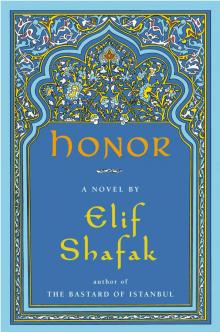 Honor
Honor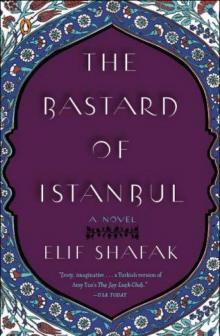 The Bastard of Istanbul
The Bastard of Istanbul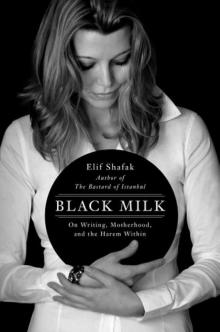 Black Milk
Black Milk The Happiness of Blond People (Penguin Specials)
The Happiness of Blond People (Penguin Specials)